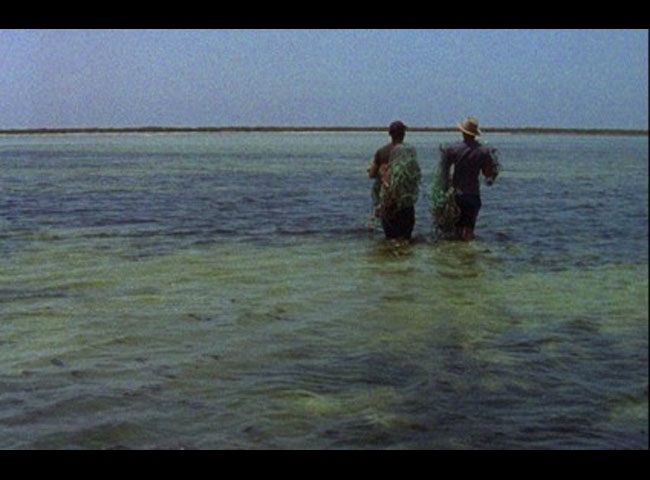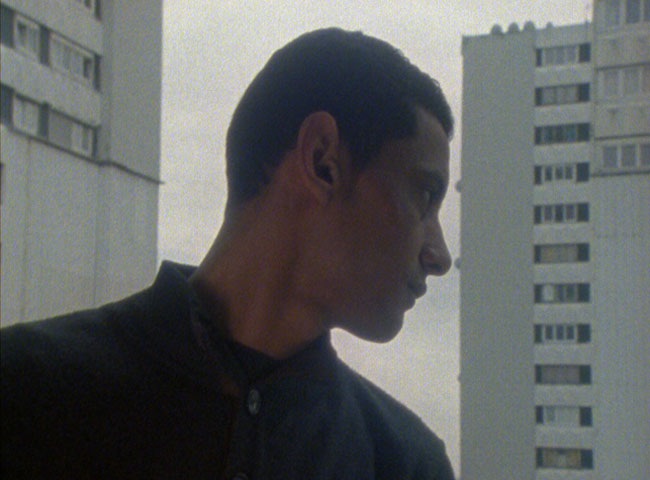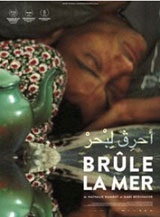Brûle la mer
-
Réalisé par Maki Berchache, Nathalie Nambot • Écrit par Maki Berchache, Nathalie Nambot
-
France • 2014 • 75 minutes • 16 mm & Super 8 mm • Couleur
- Réalisation :
Maki Berchache, Nathalie Nambot - Écriture :
Maki Berchache, Nathalie Nambot - Image :
Nicolas Rey - Son :
Nathalie Nambot, Jean Mallet - Montage :
Gilda Fine
- Production (structure) :
Les Films du Bilboquet - Participation :
CNC. Aide au développement - Ayant droit :
Les Films du Bilboquet
- N° ISAN :
non renseigné
Résumé
Brûle la mer se tient au croisement paradoxal entre l’énergie vive d’une révolution en cours, l’élan d’un départ vers l’Europe, et la violence d’un accueil refusé. Le film guette ce qui constitue la trame sensible d’une existence à un moment de rupture. Ce qu’il y a d’infime, de plus commun, loin de l’exotisme, mais hanté par le rêve, comme un appel. Il ne s’agit pas d’un film sur l’émigration ou la révolution, c’est un essai sur la liberté ou plutôt de liberté : une tentative d’évasion réelle et fictive auquel la fabrication d’un film participe, prenant part de ce processus d’émancipation : brûle la mer, les frontières, les lois, les papiers... Qu’est-ce que rompre avec sa vie passée, quitter son pays, sa famille où prévalent encore vaille que vaille des liens très forts de solidarité, d’entraide et un attachement ancestral à la terre, pour rejoindre le monde mythifié et dominé par les rapports capitalistes. Qu’est-ce que c’est : "vivre sa vie ?" Ainsi s’expriment, tout à fait clairement les réalisateurs qui, loin des clichés sociologiques, ont d’abord choisi de faire entendre quelques voix.
(Jean-Pierre Rhem, FID Marseille 2014)
Burning the Sea stands at the paradoxical crossroads between the lively energy of a revolution in progress, the momentum of a departure to Europe, and the violence of a welcome declined. The film targets what constitutes the sensitive framework of an existence at a time of rupture; that which is the smallest, the most common, far from exoticism, but haunted by a dream, like an exhortation. It is not a film about emigration or revolution, it is an essay on freedom, or rather an essay that stages freedom: a real and fictitious attempt to escape which involves the making of a film, taking part in the process of emancipation: burning the sea, borders, laws, papers, etc. What does it mean to break with one’s past life, leave one’s country and family in which, somehow or other, strong links of solidarity, mutual assistance and ancestral ties to the land still prevail, and join a world mythologized and dominated by capitalist relationships? What is meant by "living one’s life"?” Thus is clearly expressed the position of the filmmakers who, far from resorting to sociological clichés, have chosen to make some voices heard.
(Jean-Pierre Rhem, FID Marseille 2014)
Mot(s)-clé(s) thématique(s)
Sélections et distinctions
- 2016 • Festival des cinémas d'Afrique du pays d'Apt • Apt (France) • Sélection
- 2016 • Documentary Film Festival Hamburg - Dokumentar filmwoche • Hambourg (Allemagne) • Sélection
- 2014 • Les Rencontres cinématographiques internationales de Cerbère-Collioure • Cerbère (France) • Mention spéciale du Prix Institut Français de la critique en ligne
- 2014 • Doclisboa - Festival Internacional de Cinema Documental • Lisbonne (Portugal) • Sélection "Investigations"
- 2014 • FIDMarseille - Festival International de Cinéma de Marseille • Marseille (France) • Compétition Française
Comment avoir accès au film ?
- Sortie en salle
-
Édition DVD
- Il n'existe pas d'édition DVD à notre connaissance
- Accès VOD




